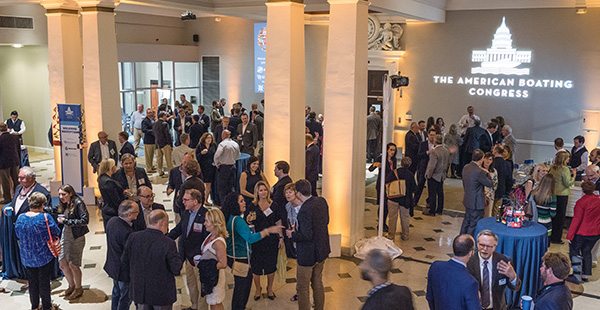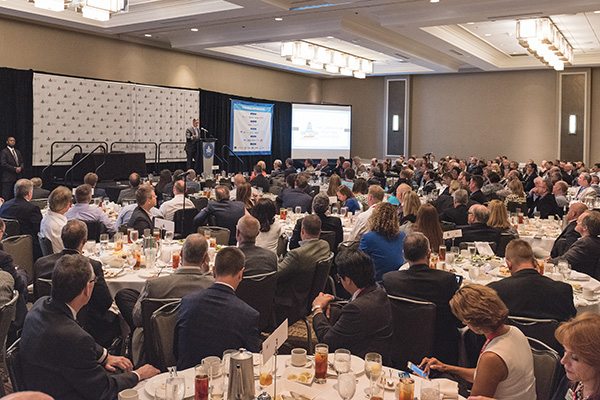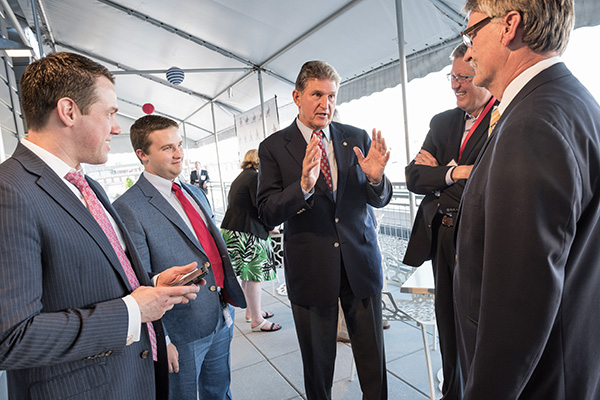American Boating Congress plans aggressive attendee advocacy

Midterm elections loom large
The National Marine Manufacturers Association intends to be politically pugnacious with its attendee outreach during this year’s American Boating Congress.
That’s because the mid-term election clock is ticking and time is running out before new lawmakers are elected and arrive in Washington, D.C.
All 435 seats in the U.S. House of Representatives and 34 of the 100 seats in the Senate will be contested this November.
“We’re entering the last few months to get legislation done before we have a whole new Congress,” said Nicole Vasilaros, NMMA’s vice president of federal and legal affairs. “We will be very aggressive in our advocacy, making sure we give attendees clear direction on Capitol Hill as we get top priorities in front of lawmakers.”
NMMA changed the dates for this year’s event to May 9-11 to make sure attendees could schedule visits and connect with people in Washington while Congress is in session, Vasilaros said.

“We’ll have all of our Hill meetings on Thursday, which will create more impact,” she added. “We want to get more people to come to ABC. Once they’ve attended, they really understand the impact, and the benefits of being there.”
ABC is organized by NMMA and co-hosted by (as of early March) nearly 20 other organizations and associations, including Boating Industry.
The lobbying and education efforts that happen during three days in the nation’s capital forge the industry’s agenda and priorities for the next two years and beyond.
Presidential recap during keynote
Chris Wallace, award-winning veteran journalist and host of FOX News Sunday, will provide the keynote during the Friday, May 11 general session.
The title of this year’s keynote address is “America Under President Trump: A View from Washington One Year Later.”

Wallace has established himself as a battle-tested media presence, an incisive, thoughtful interviewer, and a venerable authority on presidential history and election politics.
Wallace has won every major broadcast news award, including three Emmys, the Peabody Award and the Dupont-Columbia Silver Baton Award.
In 2016, he earned praise from fellow journalists and political operatives on both sides of the aisle for his sterling performance moderating the final presidential debate between Hilary Clinton and Donald Trump.
“Chris Wallace will be exciting because of the date change, and we are working off of a Wednesday to Friday schedule,” Vasilaros said.
Forefront issues during ABC
From a legislative standpoint, 2017 ended with a flourish of pro-industry news coming out of Washington.
While no legislation of the magnitude of the Tax Cuts and Jobs Act is ever perfect, the final package included a number of provisions that can be considered victories for marine manufacturers and the recreational boating industry.

Boat builders told NMMA that the R&D tax credit was extremely important to retain, as was preservation of the second home interest deduction for boats and no new luxury tax on boat sales.
“Tax reform was a huge success,” Vasilaros said. No new luxury tax on boat sales was a priority, as was preservation of the second home interest deduction for boats.
NMMA lobbied for parity with regard to the second home interest deduction for boats. “Manufacturers, are pleased with the lower corporate rates. We will see more of the benefits from tax reform in the months to come.”
In late February, the U.S. Senate Committee on Commerce, Science, and Transportation overwhelmingly approved S. 1520, the Modernizing Recreational Fisheries Management Act of 2017 (Modern Fish Act).
The legislation calls for critically important updates to the oversight of federal fisheries, including adding more tools to the management toolbox, improving data collection techniques, and examining some fishery allocations that are based on decades-old decisions.
“This has been a wonderful success story, and it’s not over yet,” Vasilaros said. “It shows how our industry can pull together broad, bi-partisan support and get initiatives passed.”
A bill that would have allowed for year-round sales of higher blends of ethanol was defeated and didn’t get a 2017 vote in the Senate Environment and Public Works Committee. This is good news for the industry and follows countless meetings and discussions NMMA has had with key Senate offices to ensure they knew of the damaging impacts of E15 on marine engines.
“We’ve been hearing about more movement on the Senate side than we have been in recent years, so that’s very promising,” Vasilaros said. “We are going to be focusing on consumer outreach. We are definitely not letting our foot off the pedal. We will use different tactic than we have in recent years and push for more education.”
President Trump’s formal announcement in early March of new tariffs on steel imports (a 25 percent tariff) and aluminum imports (a 10 percent tariff) caught many in the marine industry by surprise.
When this issue of Boating Industry went to press, a 15-day countdown regarding the president’s order was nearing its end.
“We met with the U.S. Department of Commerce to express our concerns on the aluminum anti-dumping case,” Vasilaros said. “The problem is there’s a compounding effect. Imposing a 10 percent duty on Section 232, which deals with the impact of steel and aluminum on national security, could mean upwards of a 60 percent duty on antidumping, This issue will be a key component of ABC.”

NMMA Policy Agenda
In advance of this year’s American Boating Congress, NMMA has issued a draft copy of its 2018 Policy Agenda. The following are legislative priorities for the year:
Fishing Policy
The recreational boating community strongly supports the Modern Fish Act (S. 1520 and H.R. 2023). Provisions in Modern Fish include allowing recreational fisheries to be managed using more appropriate management tools, modifying the annual catch limit requirement to allow for more adaptive approaches, and limiting the spread of catch share programs that have negatively impacted anglers and fishing.
Trade
NAFTA is critical to American marine manufacturers because of the significant supply chain and customer base located in North America. Canada and Mexico are the industry’s No. 1 and No. 3 trading partner, respectively. Urge the Administration to negotiate a fair NAFTA update that includes rules of origin updates for boat and engine packages, recognition of NMMA boat certification, regulatory coherence, and reduced technical barriers to trade. Contact the U.S. Commerce Department and to urge its leaders not to choose 3,700 aluminum manufacturers over 8,000 marine manufacturers and thousands of other impacted U.S. industry workers.
Water Infrastructure
As Congress puts together a WRDA reauthorization, a number of provisions are important to the recreational boating community. They include: ACOE permitting reforms, better treatment of low tonnage and recreational ports, and improving Aquatic Invasive Species (AIS) programs. Congress needs to pass ACOE permitting reforms, a new formula for USACE prioritization to ensure funding of low tonnage and recreational channels and direct a study on the impact of AIS programs.
Fuel Policy
The Renewable Fuel Standard (RFS) is a mandate in need of reform. While the boating industry is not anti-ethanol, we seek reform that caps ethanol at 10 percent, the federally allowable blend for marine engine use. Blends above 10 percent cause known engine damage, poor engine performance, and difficulty starting.
Workforce Development
The recreational boating industry is working to cultivate a new pipeline of talent. Apprenticeship and On the Job Training (OJT) programs are national programmatic efforts. However, access to and implementation of these funds can take on different looks depending on the state or region of an employer. The boating industry would like to see easier access to funding available for such programs and supports expansion of funding for career and technical education through the Perkins Act and expanded Pell eligibility.




